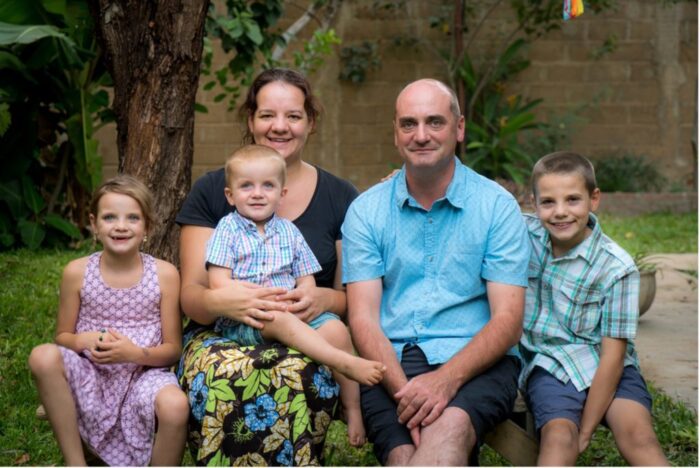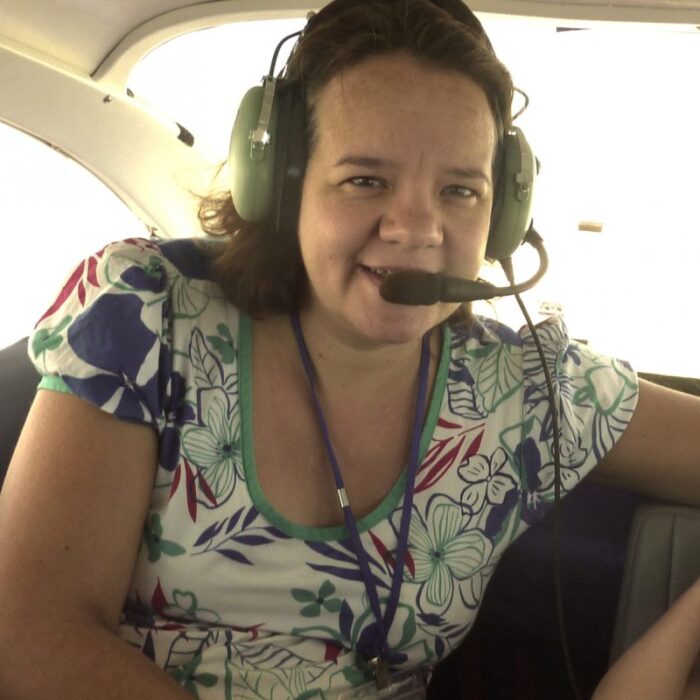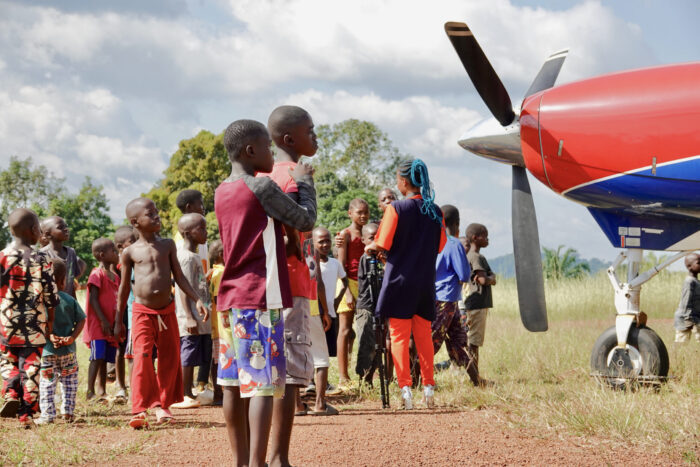Hannah’s Story – Malaria in Liberia
World Malaria Day, which falls on April 25th each year, is a day instituted by WHO member states to raise awareness of the disease and it’s continued and devastating impact around the world.
- More than 600,000 people die from Malaria every year.
- Over 75% of these are children under five.
- Children from the poorest households are 50% less likely to receive care, because access is one of the biggest barriers to survival.
MAF is joining the fight against malaria in more than 25 low-income countries across the world.
– because mosquitoes aren’t the only ones who fly.
Flying cargo including medication, mosquito nets, healthcare providers, medical researchers, and rapid-test malaria kits, MAF is providing vital access to lifesaving care for communities living beyond the reach of mainstream treatment.
Read Hannah’s story below and also Scovia’s story, Claudine’s story and Lapalama’s story.
Hannah Mumford, Aberdeen – UK
Hannah contracted malaria in April 2019 while serving with MAF in Liberia. Despite taking all the advised antimalarial medication, she suffered an acute form of the disease. Four years on, Hannah still experiences side-effects, and her life has never been the same.
Now living in Aberdeen and practicing podiatry for the NHS, she recalls her long road to recovery and how the disease may impact her life forever.

Hannah, Andrew and their three children lived in Chad and Liberia where Andrew was an MAF pilot for nine years. Credit: LuAnne Cadd
My name is Hannah, and I am a podiatrist, mum of three and a malaria survivor.
Andrew, my husband, is a pilot, and we joined MAF in 2012 compelled by our strong Christian faith and desire to serve isolated communities. Our first assignment was in Chad – one of the MAF’s hottest programmes, and then Liberia – one of the wettest.
We moved back to Aberdeen in April 2021 after nine years with many incredible experiences and fond memories of our children growing up in Africa. Being part of MAF’s mission to reach inaccessible places using aviation was a privilege.
Andrew is now a Captain with the Scottish Air Ambulance. I have returned to practice in podiatry for the NHS, and our kids are settled in schools in Aberdeen. We are very blessed to be part of Gilcomston church, which has been a wonderful support to help us re-adjust to life in Scotland and has supported us faithfully throughout our time living overseas with MAF.
My malaria journey began in April 2019. I woke up feeling achy one Monday morning, but I ignored what I thought was the regular tiredness of a busy mum. On Tuesday, I put off my weekly food shop. On Wednesday, determined, I arrived at the supermarket feeling nauseous and dizzy.
My driver Moses warned me in the car that I had malaria. “Of course not,” I joked. “I’m just under the weather.”
Moses caught me as I collapsed in the supermarket. I barely remember the journey home, but I could hear him beeping the horn to push through the busy traffic. He wanted to take me straight to hospital, but I still refused to believe it was malaria.
I spent the next week on the sofa or in bed. Moses faithfully did the school runs and returned one day to me having dropped and smashed a drinking glass. I was unconscious.

Hannah didn’t know that hundreds of malaria survivors suffer side-effects for the rest of their lives. Credit: Andrew Mumford
With Andrew flying that day, a neighbour sped me to a hospital on our compound in Monrovia, where I stayed overnight. I was confused, weak and don’t remember much. No one could hear if I called for help – but the nurses were working their absolute hardest. Mice were running in the corridors. Someone died that night. I remember hearing them wailing and crying.
I started five days of intravenous antimalarials to treat an aggressive strain of the infection. But I was one of the lucky ones. Every two minutes a child dies of malaria somewhere in the world – many of them in places were MAF carries out humanitarian work. It’s really humbling that I’m here to tell my story. So many people were praying for me.
Ten days after my treatment, tests showed no traces of malaria in my body. I’ve known lots of people who bounce back quickly once the infection is gone. But that wasn’t my experience at all.
Three weeks later, I still couldn’t walk around the house. After a month, I could barely make it to the front gate. If I managed to wave my kids off to school, I would spend the rest of the day on the sofa. I nibbled crackers, and our amazing community cooked meals for the family. It was a difficult and painful time but we were very well supported.
I remember days of just listening to the waves on the sea – all I could do was pray. I had no idea malaria could have this kind of effect. But I’ve since found out that hundreds of malaria survivors never return to full health. Some struggle physically, some psychologically. Others emotionally.
But the scars carried by survivors like me still don’t compare to the unimaginable loss of life for those unable to access treatment.
I could live with the side-effects of malaria for the rest of my life. But I am one of the fortunate ones who made it to hospital. A child dies every two minutes to malaria across the world – I won’t forget those less fortunate than me.
Hannah Mumford – malaria survivor

The Mumford family visited a remote village while living in Liberia between 2018 and 2021. Credit: photograph provided by family.
Often, I did feel very frustrated, and it took me a while to talk about my malaria journey. Two years on, I was a different, weaker version of myself. I often had ‘episodes’, where my brain couldn’t tell my legs to move. I remember having to sit in my front garden for hours until the sporadic attacks passed, and I could move again.
There have been other long-term impacts on our daily life – simple tasks like going shopping were a nightmare for years. My brain couldn’t sporadically think about what to have for dinner, and sometimes I had to say ‘no’ to small things like making pizza from scratch.
If I am honest, even 15 months ago, I wouldn’t have comprehended going back to work. There are still days when I stay in and miss family outings if I know my legs and energy levels won’t cope. I find these moments incredibly frustrating, sad, and demoralising. The kids sometimes beg me to come, but I know that physically I just can’t manage. I guess we have learned to accept this is our way of life. I pace myself, and Andrew steps in often going above and beyond to keep our busy family ticking over.
Aside from the physical side-effects, I often experience brain fog. I sometimes feel overwhelmed making plans or being in large social gatherings. Rest is a key component to my week which must be factored in every day – even just 30 minutes of sitting down. It’s rather extraordinary that I am now able to work two days a week, and I absolutely love it. I’m so grateful to have come this far in my recovery. I know I am very blessed to have accessed treatment at the critical moment.
Perhaps I will live with the side-effects of malaria for the rest of my life. But find it so sad that some people risk not taking antimalarials when they travel. This disease kills more than 600,000 people every year – I am one of the fortunate ones who made it to hospital.
I will never forget the strength God gave me in those darkest times, but equally, I won’t forget those who are less fortunate than me.
A USAID Health Director announced in May 2022 that the number of malaria cases in Liberia reached over 900,000, and remains Liberia’s most serious public health problem and leasing cause of infant mortality.
In October 2022, Liberia launched a nationwide malaria survey aimed at tracking the country’s progress in the fight against malaria. The household survey will be essential in gathering information about malaria prevalence, malaria interventions – such as the ownership of mosquito nets – and treatment for pregnant women and children aged 6-59 months.
WHO country representative in Liberia Dr Peter Celement said, ‘Malaria continues challenge us, and remains the main cause of illness and death in our communities. We must combat malaria with relevant tools that are evidence-based that will trigger a paradigm shift in malaria interventions. The outcome of this survey will unearth innovative tools for malaria control and elimination in Liberia.’
Scovia’s Story – Malaria in Northern Uganda
Claudine’s Story – Malaria in Democratic Republic of Congo
Malaria in Lapalama, Papua New Guinea



